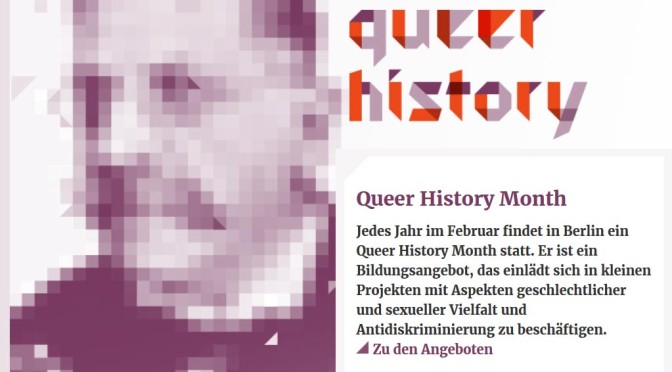We did an Interview with Dr. Nina Reusch, historian at the Friedrich-Meinecke-Institute in Berlin and member of the Public History Project “LSBTTIQ in Baden-Württemberg“
- What is the stand of research on the continuities of paragraph 175 after National Socialism?
Since the 1970s, considerable research has been done in the context of the homosexual emancipation movement. In the meantime, the subject is becoming more and more important in the academic circles as well, which is good not only for research, which can be broadened and diversified, but for the discipline of History as well, engaging now with queer questions and research topics.
- Could you tell us a little bit about public history projects and the way queer history is being taught in German schools?
Overall, queer history is not included in the in German schools’ standard curriculum, but there are various projects that can be used as a starting point. Here, in Berlin, February is always the Queer History Month; during this time some school classes engage with queer history and other queer-related topics in terms of content or art. The project’s homepage offers lessons and materials for teachers who would like to bring queer topics into history lessons. Beyond school, public history projects also bring queer history to a general audience – such as the exhibition ‘Homosexualities’ in the Schwulen Museum* and the Deutsches Historisches Museum, or, as it is currently in Baden-Württemberg, Public History connects queer history to research projects. Last year, a project was launched that brings together research, public history and regional queer history creating opportunities for a greater participation.
- What are your thoughts on the project by Minister Maas and the discussions on rehabilitation for victims of paragraph 175?
The rehabilitation of men who were convicted under paragraph 175 is a much welcomed and almost overdue project. A reasonable compensation for the victims of this homophobic legislation should also be implemented.
- Do you think this project reflects the discussion on paragraph 175 in the German public space?
I think that before the announcement by the Minister of Justice, many people were not even aware that homosexual relationships among men were prosecuted for so long in the Federal Republic. The discussion has created a certain awareness and therefore it should be welcomed.
